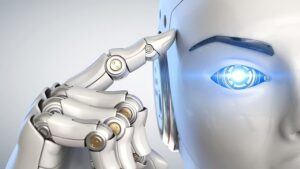Welcome to the 21st century! We have self-driving cars, automated customer services, and applications that can write stories without human intervention! These things, and many others, are a reality thanks to advances in machine learning and artificial intelligence or AI for short.
AI engineers play a crucial role in the advancement of artificial intelligence and are in high demand thanks to the increasingly greater reliance the business world is placing on AI. This article explores the world of artificial intelligence engineering, including defining AI, the AI engineer’s role, essential AI engineering skills, and more.
But before we show you how to become an AI engineer, let’s define the term.
What Is Artificial Intelligence?
Artificial intelligence (or AI for short) is a set of technologies AI engineers leverage to enable computers to perform various advanced human-like mental functions, including seeing, analyzing data, understanding and translating the spoken and written word, making suggestions, and more.
Artificial intelligence helps machines learn from experience, perform human-like tasks, and adjust to algorithms’ new input data, and it relies on deep learning, natural language processing, and machine learning.
So, AI simulates activities associated with human brains and lets machines function separately from human intervention. With this in mind, let’s find out what an artificial intelligence engineer is, what they do, and how they enable AI to function.
Also Read: Are Machine Learning and Data Science the Same?
What is AI Engineering?
Artificial intelligence engineering is a field of research and practice that combines the principles of computer science, software engineering, systems engineering, and human-centered design to develop artificial intelligence systems per human needs for specific tasks and processes.
AI engineering employs computer programming, algorithms, neural networks, and other technologies to develop artificial intelligence applications and techniques.
Now that we’ve sorted out the definitions for artificial intelligence and artificial intelligence engineering, let’s find out what precisely an AI engineer does.
What Does an AI Engineer Do?
Here are the roles and responsibilities of the typical artificial intelligence engineer. Note that this role can fluctuate, depending on the organization they work for or the size of their AI staff.
- Use machine learning algorithms and deep learning neural networks to build artificial intelligence models to gather valuable business insights.
- Streamline organizational processes by performing statistical analysis and using interpretation techniques.
- Develop, program, and train networks to create artificial intelligence models that can solve complex tasks.
- Create and maintain the artificial intelligence infrastructure.
- Create different types of artificial intelligence applications, such as language translation, visual identification or perception, and contextual advertising based on sentiment analysis.
As you can see, artificial intelligence engineers have a challenging, complex job in the field of AI. So naturally, AI engineers need the right skills and background, and that’s what we’re exploring next.
What Are the Prerequisites and Requirements for AI Engineers?
Some IT positions don’t require a degree. In these cases, prospective candidates fulfill the educational requirement by instead citing their hands-on work experience and taking a few classes. Unfortunately, artificial intelligence engineering is NOT one of those careers!
Artificial intelligence is a complex, demanding field that requires its engineers to be highly educated, well-trained professionals. Here is a breakdown of the prerequisites and requirements for artificial intelligence engineers.
- Have a high school diploma or equivalent.
- Earn a bachelor’s degree in computer science or a related field such as data science, information technology, mathematics, or statistics. Optionally, keep your education going by getting your master’s degree in a similar area. This strategy helps tip the scales in your favor when looking for an AI engineer position.
- Gain programming skills in languages such as Python, R, Java, or C++.
- Understand linear algebra, probability, and statistics.
- Get familiar with big data technologies such as Apache Spark, Hadoop, Cassandra, and MongoDB.
- Learn algorithms and related frameworks like PyTorch, Theano, TensorFlow, and Caffe.
- Possess a collection of soft skills that include:
- Business intelligence. The more the AI engineer grasps how companies work, the target audience, and the competition, the easier it is to turn AI technological concepts into commercial product assets.
- Communication skills. AI engineers must deal with people who possess little to no AI knowledge.
- Critical thinking. AI engineers must quickly evaluate facts to reach realistic conclusions or develop multiple solutions to one issue.
- Domain expertise. This expertise refers to recognizing the organization’s demands, the obstacles the AI must overcome, and what optimized solutions are needed.
- Problem-solving. Sometimes, AI engineers must think creatively to solve a complex problem.
- Teamwork. AI teams traditionally work closely with IT teams.
- Time management. AI engineers must conduct research, organize and plan projects, and create and test software while dealing with stakeholders.
Now that we know what prospective artificial intelligence engineers need to know, let’s learn how to become an AI engineer.
Also Read: Machinе Lеarning Algorithms: A Beginner’s Guidе
Digging Deeper into How to Become an AI Engineer
AI engineers require a rich mix of education, skills, and training. So, how do you get started on this course? Here is a series of recommended steps to help you understand how to become an AI engineer.
- Get your degree. Obtain a degree in one of the abovementioned disciplines.
- Earn some certifications. Certifications impart valuable skills while offering recruiters proof that you have the qualifications needed to do the job. In addition, many online AI training courses can round out your skill set in neural networks, natural language processing, robotics, and visual image recognition.
- Create your personal network. Seek out AI professionals and start forging ties with them. If you build up your professional AI contacts, you create connections that can help you find a job opening or alert you to a new AI trend.
- Get some practical experience. Work on a few AI projects, and many are offered through online courses. In addition, that professional network you created could help you find opportunities for hands-on experience.
- Apply for AI engineer jobs. Then, finally, it’s time to send out resumes and set up interviews. Good luck!
When you take all this AI engineer information in, the requirements and prerequisites, the responsibilities of the position, and all of the steps you must take to get the job, you may wonder if it’s all worth it. Why should you become an artificial intelligence engineer in the first place? Let’s address that.
Why Should You Become an AI Engineer?
Artificial intelligence has endless potential to improve and simplify work typically done by people, including tasks like business process management, image processing, speech recognition, and even diagnosing diseases. It’s an exciting field that brings the possibility of profound changes in how we live. Consequently, the IT industry will need artificial intelligence engineers to design, create, and maintain AI systems.
Some people fear artificial intelligence is a disruptive technology that will cause mass unemployment and give machines control of our lives, like something out of a dystopian science fiction story. But consider how past disruptive technologies, while certainly rendering some professions obsolete or less in demand, have also created new occupations and career paths. For example, automobiles may have replaced horses and rendered equestrian-based jobs obsolete. Still, everyone can agree that the automobile industry has created an avalanche of jobs and professions to replace those lost occupations.
Artificial intelligence is the future, and the best way to overcome any reservations about it is by embracing it, learning about it, and considering it a viable career opportunity. So, how do you learn more about how to become an AI engineer? Glad you asked!
Also Read: AI in Marketing: Here’s What You Need to Know
Do You Want to Learn More About How to Become an AI Engineer?
If you’ve been inspired to enter a career in artificial intelligence or machine learning, you must sharpen your skills. This AI ML certificate course can help you fill those knowledge gaps.
This bootcamp provides a high-engagement learning experience that will help you gain skills and expertise in the following and more:
- Deep Learning
- Ensemble Learning
- Reinforcement Learning
- NLP
- Speech Recognition
- GANs
- Neural Networks
- Computer Vision
The six months of applied learning include over 25 real-world projects with integrated labs and capstone projects in three domains that will validate your skills and prepare you for any challenges you must tackle.
According to Ziprecruiter.com, an artificial intelligence engineer working in the United States earns an average of $156,648 annually. The range goes as low as $79,500 but as high as $266,500.
So, if you’re looking for an exciting career on the cutting edge of today’s technology that offers a generous compensation and countless opportunities, why not choose artificial intelligence? Don’t wait; sign up today for this valuable bootcamp and get the skills needed to make an impact in today’s fast-paced AI world. Join today!
You might also like to read:
What is Artificial Intelligence? A Comprehensive Guide for Beginners
All About Artificial Intelligence Skills
Are the Sciences of Artificial Intelligence and Machine Learning the Same Thing?






